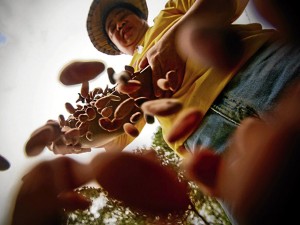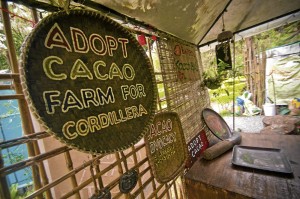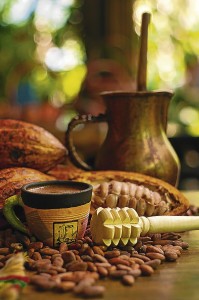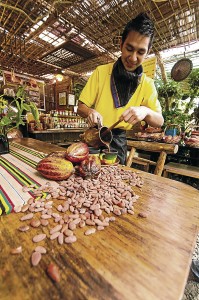Reviving choco tradition–from planting to preparing

HORACIO Jojo Castro invested in Choco Late de Batirol to help develop a cacao tree farm for the Cordilleras.
BAGUIO CITY—The summer capital’s best native chocolate drink is served in a small restaurant at the Igorot Garden in Camp John Hay.
Horacio “Jojo” Castro has been running Choco-late de Batirol for three years now in that “rainforest garden,” with a single advocacy in mind—to establish an eco-friendly cacao farm for the Cordillera.
Castro has planted 30 cacao seedlings around the restaurant, but he wants to propagate 20,000 seedlings in Itogon, Benguet, to create an ecotourism destination.
“Many people have been planting coffee trees in the Cordillera, but I chose cacao because this can contribute to our food security. We have so many idle lands in the region which can be planted with cacao and we can practice organic farming too if we can adopt a farm for cacao,” he says.
He has been invited to various forums and conferences in the region to share his expertise on preparing the native chocolate drink.
“Chocolate is a traditional drink which requires special preparation. I can share my expertise on preparing it and I can share my knowledge also on how to grow cacao,” he says.

RESIDENTS will be organized and taught cacao farming that will lead to livelihood programs and income-generating activities.
In September last year, Castro submitted a project proposal to the Department of Science and Technology for the propagation of cacao farms in the Cordillera.
“Our vision is to convert or create a sustainable ecofriendly and ecotourism destination, through an advocacy on environment preservation. We believe it is also important to join efforts in [reducing the impact] of global warming and in promoting waste management,” he says.
His aim of propagating 20,000 cacao seedlings in three to four years will start in Sitio Bubun in Barangay Virac in Itogon.
Through the “Adopt a cacao farm in the Cordillera,” he says residents will be organized and taught cacao farming that would eventually lead to livelihood programs and income-generating activities. A cacao tree bears fruit after five years.
He envisions the project running from three to 20 years.
Castro started planting cacao seedlings in his backyard in Barangay Camp 7 here and encouraged his friends to do the same.
His Choco-late de Batirol restaurant has become a venue for his campaign.
Aside from growing cacao seedlings around the restaurant, he occasionally engages patrons and visitors so he could discuss with them his advocacy.
Cacao pods and beans are available in the restaurant. Each cacao pod sells from P60 to P100 depending on the size. A pod contains 30 to 35 beans.
Castro gets his supply of cacao beans from Davao, Batangas and Apayao.
He says the proper roasting of cacao beans is important to give the chocolate drink its distinct flavor.
“What we are making here is a world-class chocolate drink. Cacao beans are fermented, roasted and cooked and then mixed with peanuts to create a chocolate paste. Our chocolate has a distinct taste and texture,” Castro says of his restaurant’s bestseller, which sells for P80 a cup.
He intends to put the proceeds of his cacao propagation program to civic activities, like supporting feeding projects.
“We are here not to earn but to help those who need help. Everything we are doing here is about food security and the environment. We are doing that by reviving the tradition of chocolate—from plantation to preparation,” he says.
PHOTOS BY RICHARD BALONGLONG /INQUIRER NORTHERN LUZON
















